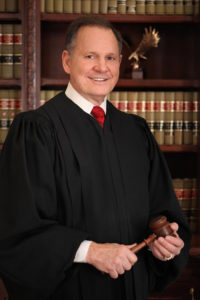On the Hill: Strange Times in Alabama

Humanists would be forgiven for thinking that things couldn’t get much worse on the federal level of American government. After all, the religious right has surged back into power through its newfound control of Congress, the White House, and even the Supreme Court with the recent Gorsuch nomination and confirmation.
But, as the old saying goes, when it rains, it pours. And, if things don’t go as humanists hope in the upcoming Alabama Senate primary, the rain may be replaced by fire and brimstone in the person of theocrat Roy Moore.
Alabama is currently holding a special Senate election to replace former US Senator Jeff Sessions, who vacated his seat in order to serve as Attorney General (and occasional punching bag) in the Trump administration. As this is considered a safe Republican seat, progressives and humanists are just seeking to limit the damage by stating their opposition to the most objectionable candidates while holding their fire on those who might be more moderate.

Roy Moore
The “moderate” Republican candidate in this special election is hardline conservative Senator Luther Strange, who was appointed to the seat after Sessions resigned. Strange has the repeated endorsement of President Trump and conservative leaders, and while those endorsements alone would normally cause humanists to recoil from his nomination, his opponent Roy Moore’s religious extremism is causing humanists to root for Strange.
Roy Moore, formerly of the Alabama Supreme Court, is perhaps the most dangerous figure in the effort to maintain the separation of church and state. For those who don’t remember, Moore had a 5,000 pound statue of the Ten Commandments installed in the Alabama Supreme Court, and when he was ordered to take it down he refused and was removed from office for violating the Cannon of Ethics. On his removal, Moore stated: “to acknowledge God cannot be a violation of the Canons of Ethics. Without God there can be no ethics.”
While Moore was removed from the court, he won reelection a few years later, and, once again, his theocratic inclinations got him in trouble. After same-sex marriage was legalized nationwide, Moore ordered lower court judges that “until further decision by the Alabama Supreme Court, the existing orders of the Alabama Supreme Court that Alabama probate judges have a ministerial duty not to issue any marriage license contrary to the Alabama Sanctity of Marriage Amendment or the Alabama Marriage Protection Act remain in full force and effect.” For his refusal to honor federal law, Moore was suspended from his position, and likely would have once again been removed from office if he had not willingly resigned in order to run for the US Senate.
The bad news is not only that Moore beat Strange handily in the first round of the primary (while failing to achieve enough votes to force Strange to concede), but that he is polling much better than Strange after the first primary round. So it’s looking like Moore will win the Republican primary, and therefore the general election.
And while no one senator has the ability to unilaterally change federal law, Moore has the potential to be a terrible senator when it comes to secularism and civil rights. From his ability to introduce harmful legislation that allows religiously motivated discrimination, to his ability to block nominations of federal appointees because of insufficient religiosity, Moore could truly bring about an era of fundamentalist Christian public policy in the US Senate.
With the next stage of the Alabama primary just a month away, humanists should hope (and ask their religious friends to pray) that Senator Strange prevails and that Roy Moore stays in Alabama.
